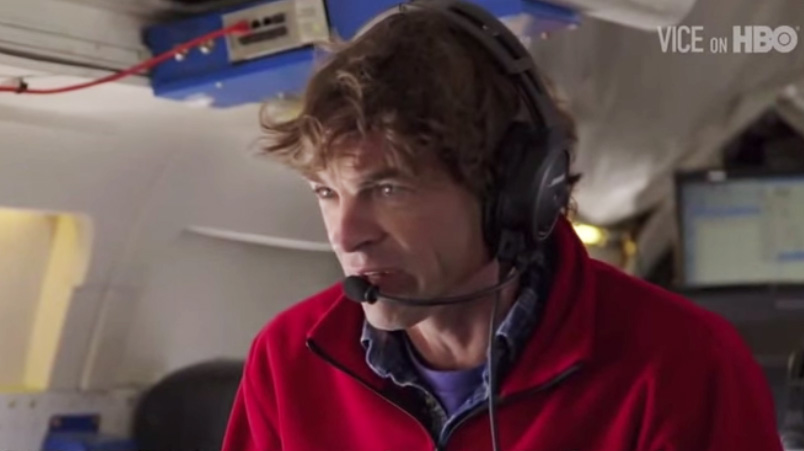Eric Rignot: Observations suggest that ice sheets and glaciers can change faster, sooner and in a stronger way than anticipated
Eric Rignot Professor of Earth system science at the University of California, Irvine, and scientist at NASA’s Jet Propulsion Laboratory was interviewed on sea level rise and projections.
Ice sheets and glaciers can change faster, sooner and in a stronger way than anticipated
Machens: As an ice sheet expert, how do you see the sea-level projections of the 5th IPCC report?
Rignot: The IPCC Report is a consensus and the projections are defined by numerical models. The results are very conservative because they exclude the possibility of rapid changes of the ice sheets as the numerical models do not yet know how to deal with those.
The observations from the last 20+ years clearly suggest that ice sheets and glaciers can change faster, sooner and in a stronger way than anticipated but this information has not yet filtered into more realistic projections. I personally view the IPCC AR5 projections as unrealistically low.
 Professor Eric Rignot Antarctica (NASA/JPL)
Professor Eric Rignot Antarctica (NASA/JPL)
Brüstow: Apart from sea level rise, what are the other major global impacts you foresee resulting from the Antarctic ice sheet melt?
Rignot: Ice sheet melt may influence the formation of Antarctic bottom water, which participates in the global ocean circulation, but this effect should take place over centuries, it is unlikely to be felt in the coming century.
At least one meter SLR and beyond
Machens: If we would stop all emissions today, how much sea level rise is already in the pipeline?
Rignot: Difficult to say but I do not think we can do much about the coming century in terms of slowing sea level rise. We are likely going to get at least one meter SLR and beyond.
Machens: There are signs that East Antarctica might not be that stable, as previously thought. Does this mean we have to revise figures?
Rignot: East Antarctica has marine-based sectors like West Antarctica but few of them have retrograde beds, i.e. beds that get deeper inland, so they are more immune to rapid collapse yet they remain serious concerns for sea level rise because they hold together far more ice than West Antarctica.
At present, numerical models are simply unable to deal with East Antarctica for a variety of reasons including poor model constraints and insufficient understanding of key processes, e.g. circulation of warm water around the periphery and its impact on ice shelf melt.
A variety of scenarios are possible
Machens: Hansen (2007), assumed an ice sheet contribution of 1 cm for the decade 2005–15, with a potential ten year doubling time for sea-level rise, based on a nonlinear ice sheet response, which would yield 5 m this century. Considering past sea level sometimes rose quickly, jumps associated with catastrophic ice-sheet collapses, Hansen appears plausible. Thus, are we getting closer to modeling ice sheet dynamics in a nonlinear fashion?
Rignot: Jim’s calculations are back of the envelope calculations that do not include any ice physics. That ice sheet loss will proceed in a non linear fashion is certainly a given but from there on a whole variety of scenarios are possible, and we do not have the tools in hand to answer that question.
We need fully coupled ice sheet/ocean/sea ice/atmosphere models and we do not have them now. 5 m this century is hard to conceive, because even a speed up of all glaciers in Antarctica and Greenland by a factor 10 would not get us there in time. But I would rather hear Jim’s upper bounds being discussed than the overly conservative scenarios from existing, poorly skilled numerical models.
Machens: Thank you for the interview.
Related
- Our Rising Oceans with Eric Rignot
- Irreversible loss of world’s ice cover should spur leaders into action, say scientists
- Sea level rise (Wikipedia)
About the Author: CLIMATE STATE
POPULAR
COMMENTS
- The risk with the path to a hothouse Earth | Climate State on Climate Tipping Points Existential Threat to Our Life Support Systems
- Robert Schreib on Electricity generation prices may increase by as much as 50% if only based on coal and gas
- Robert Schreib on China made a historic commitment to reduce its emissions of greenhouse gases
- Lee Nikki on COP30: Climate Summit 2025 – Intro Climate Action Event
- Hollie Bailey on Leaders doubled down on fossil fuels after promising to reduce climate pollution
[…] http://climatestate.com/2015/06/09/eric-rignot-observations-suggest-that-ice-sheets-and-glaciers-can… Source […]